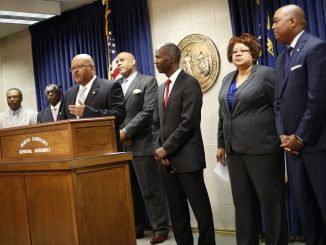
RALEIGH — A bill adding additional funding to the Opportunity Scholarship Program to clear a waitlist of 54,800 applications that easily passed the Senate earlier this month has been stymied in the House.
The Senate approved House Bill 823 on May 2, but the bill has remained in the House Rules, Operations and Calendar Committee.
The bill contains $463.5 million over the next two years to clear the waitlist for the Opportunity Scholarship Program (OSP) and creates an Education Reserve Fund.
The bill, however, has been stalled because of disagreements between the Senate and House over where the money will come from.
A statement issued to North State Journal from the office of House Speaker Tim Moore (R-Kings Mountain) said, “The Speaker has committed to fully funding Opportunity Scholarships. The question is simply what the funding source will be.”
The OSP was created by the General Assembly in 2013. OSP awards are given based on a sliding scale determined by a family’s household income, and all North Carolina families can apply to the program.
The grants are awarded in tiers, with lower-income families and returning grant recipients receiving priority. The funds can be used to pay tuition and fees to attend an eligible private schools chosen by a family.
This year’s scholarships went quickly, and more than 77,000 families applied. In the first round of awards, 13,511 families in the lowest income tier (Tier 1) and close to 2,300 families in Tier 2 were offered an award.
Mid-May data from the North Carolina Education Assistance Authority, which oversees OSP, showed some updated numbers for the program. The total number of applications now stands at 71,956 with a breakdown as follows: Tier 1: 13,866; Tier 2: 18,781; Tier 3: 26,652; Tier 4: 12,657.
The award amounts based on maximum family gross income and number of members in a household by tier are Tier 1: $7,468; Tier 2: $6,722; Tier 3: $4,480; and Tier 4: $3,360.
Additional information on the OSP can be found at ncseaa.edu/
Charter schools in high demand
Executive Director of the Office of Charter Schools Ashley Baquero informed the North Carolina State Board of Education that waitlists for charter schools in the state have increased significantly.
Baquero presented a draft of the Annual Charter School Report to the General Assembly to the board, which shows 169 charter schools had reported waitlists totaling 85,551 students. Broken down, 83 of 169 schools reported a waitlist of 200 or more students, and 37 had reported a waitlist of 700 or more.
For the 2022-2023 school year, 145,075 students were enrolled in 211 charter schools across the state. The enrollment number is 10% of the total state K-12 student enrollment of 1,428,765.
The 2023 waitlist is 8,550 more than reported in 2022, an 11% increase. Student enrollment went from 137,500 in the 2022 report to 145,075 in the 2023 report, a 5.5% jump.



